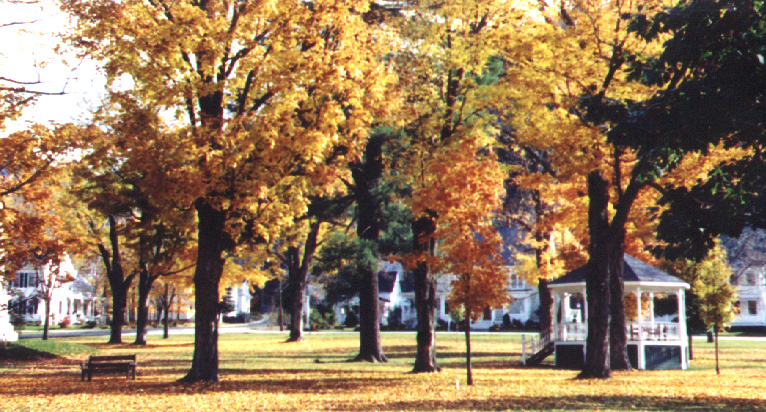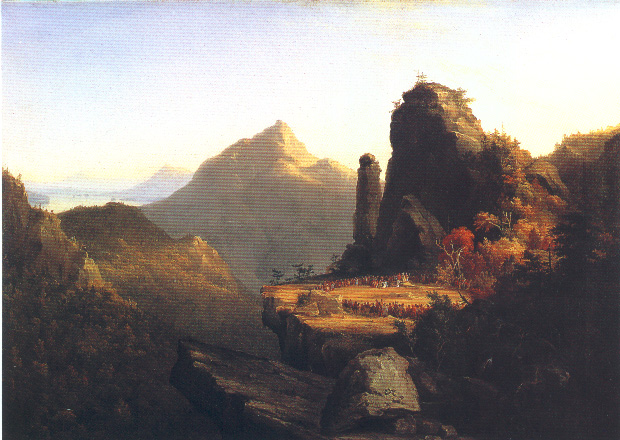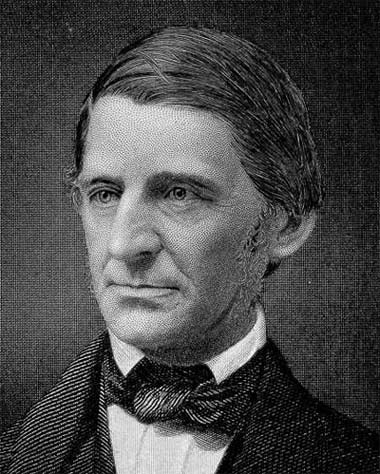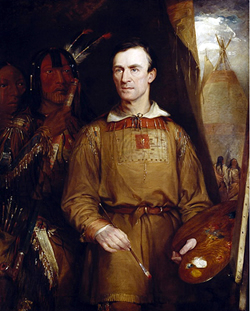 Vermont, town common.
Vermont, town common. 
Reisner
Landscape as artifact | The land | The economy | Model | literature | Catlin | Emerson | Thoreau | Lesson

Emerson
Landscape as an artistic subject
In enumerating the values of nature and casting up their sum, I shall use the word in both senses; -- in its common and in its philosophical import. In inquiries so general as our present one, the inaccuracy is not material; no confusion of thought will occur.
Nature, in the common sense, refers to essences unchanged by man; space, the air, the river, the leaf. Art is applied to the mixture of his will with the same things, as in a house, a canal, a statue, a picture. But his operations taken together are so insignificant , a little chipping, baking, patching, and washing, that in an impression so grand as that of the world on the human mind, they do not vary the result.
Emerson, NATURE, 1830.
Since Plato we have believed that civilization, by transforming landscape is completing a second nature within God’s original creation and retrieving paradise from its loss humanity’s fall on account of original sin in the Garden of Eden.
Landscape as artifact | The land | The economy | Model | literature | Catlin | Emerson | Thoreau | Lesson
- 1763 Royal Proclamation blocking westward expansion.
- 1801 Jefferson's election & peaceful "anti-federalist" revolution.
- 1807 Panic.
- 1814 British burn Washington and attack Baltimore.
- 1819 Financial panic sets aside payments on lands in the public domain.
- 1825 Opening of the Erie Canal, 363 miles long, begun in 1817.
- 1836 Emerson's Nature
- 1837 Panic, social unrest.
- 1846 War with Mexico over Texas and the US boundary.
- 1854 civil unrest and violence in Kansas bewtween anti and pro slavery forces.
- 1857 Panic, social unrest.
- 1859 Darwin's Origin of Species.
- 1864 Man and Nature, by George Perkins Marsh defines humans as agents of geologic change and advocated geographical regeneration to restore numerous deteriorated watersheds.
Landscape as artifact | The land | The economy | Model | literature | Catlin | Emerson | Thoreau | Lesson
Geographical regeneration was the call to restore the disturbed harmonies produced by settlement, industrialization, mining, deforestation and soil erosion.
Nature versus Civilization
1782-1854
Revolutionary War to the Mexican War and the civil war in Kansas.
Capitalist economy emerged after the War of 1812-1814
“fostering and ethos of competition.”
Deterioration of the watershed, vanishing wildlife & fisheries, and deforestation was “apparent to eastern elites.”
“Artists, poets, novelists, essayists, travelers, and explorers’ . . . responses reveal ambivalent feelings about the benefits of ‘civilization’ and those of ‘nature.’ “
The commercial economy:
Boom of war and bust of 1819
Soldiers were given western land in exchange for service
Panic and depression o5 1837
Panic and depression of 1857
Technological transformation
- Oliver Evans, Automated mill
- Eli Whitney, Cotton gin & replaceable parts for guns
- Steam Engine, water and land (England to America)
- Canals (Lowell Mills and the use of the falls)
- Joseph Henry and electro-magnets
Indian Removal after the S. Appalachian gold rush (Cherokee)
Landscape as artifact | The land | The economy | Model | literature | Catlin | Emerson | Thoreau
| Lands | X | labor | = | wealth |
|---|---|---|---|---|
| Wheat | free | flour, bread | ||
| Corn | free * slave | bread & liquor | ||
| Cotton | slave | textiles | ||
| Forestry | naval stores | construction & shipping | ||
| Salt | preservatives | cured pork, fish, beef | ||
| Watersheds | mechanization | commerce, speculation |
Landscape as artifact | The land | The economy | Model | literature | Catlin | Emerson | Thoreau | Lesson
Landscape took on an emerging character not before seen in the Americas:
- “Majestic grandeur,”
- “Breathtaking abundance,”
- “the air was darkened by whistling wings,”
Birth of a national literature
"Thanatopsis" 1817
TO HIM who in the love of Nature holds
Communion with her visible forms, she speaks
A various language; for his gayer hours
She has a voice of gladness, and a smile
And eloquence of beauty, and she glides 5
Into his darker musings, with a mild
And healing sympathy, that steals away
Their sharpness, ere he is aware.
A Forest Hymn
And to the beautiful order of thy works 118
Learn to conform the order of our lives.
"And suns grow meek, and the meek suns grow brief, and the year smiles as it draws near its death."
William Cullen Bryant, 1794 - 1878.
By 1840, Bryant had largely abandoned poetry to become one of the country's leading advocates for abolition. From 1856 on, the Evening Post was a Republican paper, supporting the arming of abolitionist settlers in Kansas, deriding the Dred Scott decision, and celebrating John Brown as a martyr.
Phyllis Wheatley, African woman poet.
John James Audubon “the luxuriant trees. The balmy air…” of Indian Key
James Fennimore Cooper. Leatherstocking, Natty Bumppo
“It’s much better to kill only such as you want, without wasting your powder and lead, than to be firing into God’s creatures in such a wicked manner.”
p. 177.
Landscape as artifact | The land | The economy | Model | literature | Catlin | Emerson | Thoreau | Lesson
George Catlin, 1841.
"The very use of the word savage, as it is applied in its general sense, I am inclined ot believe is an abuse of the word, and the people to whom it is applied."
"I am fully convinced , from long familiarity with these people, that the Indians misfortune has consisted chiefly in our ignorance of their true native character and disposition, which has always held us at a distrustful distance from them...a hostile foe."
George Catlin, 1844.
p. 182.
http://americanart.si.edu/catlin/highlights.html
He argued that there needed to be a place reserved inits batural state for "Wild beasts and wild men," making George Catlin the author of the idea of the national park in American tradition.
Landscape as artifact | The land | The economy | Model | literature | Catlin | Emerson | Thoreau | Lesson
Emerson, Nature, 1844.
The over soul
“man is a stream, whose source is hidden."
“Meantime within man is the soul of the whole; the wise silence; the universal beauty, to which every part and particle is equally related; the eternal ONE.”
“We see the world piece by piece, as the sun, the moon, the animal, the tree; but the whole, of which these are the shining parts, is the soul . . .”
"It is not wise but sees through all things,’
"A chief event of life is the day in which we have encountered a mind that startled us."
Landscape as artifact | The land | The economy | Model | literature | Catlin | Emerson | Thoreau | Lesson
Henry David Thoreau, teacher and philosophical iconoclast.
- born July 12, 1817, Concord, Massachusetts, New England.
- died May 6, 1862, Concord
"Books are the carriers of civilization. Without books, history is silent, literature dumb, science crippled, thought and speculation at a standstill. I think that there is nothing, not even crime, more opposed to poetry, to philosophy, ay, to life itself than this incessant business."
"Do not be too moral. You may cheat yourself out of much life. Aim above morality. Be not simply good; be good for something."
"A man is rich in proportion to the number of things he can afford to let alone. "
1835 he contracted tuberculosis
Cape Cod, 1844, published after his death.
"As a single footstep will not make a path on the earth, so a single thought will not make a pathway in the mind. To make a deep physical path, we walk again and again. To make a deep mental path, we must think over and over the kind of thoughts we wish to dominate our lives. "
"Every creature is better alive than dead, men and moose and pine trees, and he who understands it aright will rather preserve its life than destroy it."
Walden – 1854.
Merchant, pp. 166-186.
Landscape as artifact | The land | The economy | Model | literature | Catlin | Emerson | Thoreau | Lesson
When we speak of nature in this manner, we have a distinct but most poetical sense in the mind. We mean the integrity of impression made by manifold natural objects. It is this which distinguishes the stick of timber of the wood-cutter, from the tree of the poet. The charming landscape which I saw this morning, is indubitably made up of some twenty or thirty farms. Miller owns this field, Locke that, and Manning the woodland beyond. But none of them owns the landscape. There is a property in the horizon which no man has but he whose eye can integrate all the parts, that is, the poet. This is the best part of these men's farms, yet to this their warranty-deeds give no title.
Emerson, Nature, 1836, essay.
http://www.vcu.edu/engweb/transcendentalism/authors/emerson/nature.html
Landscape as artifact | The land | The economy | Model | literature | Catlin | Emerson | Thoreau


